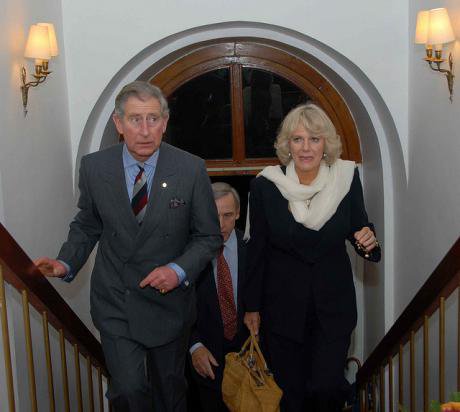
Britain's best arms salesman? Flickr/Ra'ed Qutena. Some rights reserved.The pages of British newspapers are littered with discussions of royal intervention in public debate. The lobbying and meddling of Prince Charles has, of course, been widely covered, not least by OurKingdom, where the future monarch’s “aristocratic de haut en bas interventions in architectural and other politics” have been rightly criticised.
Elsewhere, we are met with more questions. Was it irresponsible of Charles to accuse big agricultural firms of conducting a “gigantic experiment with nature and the whole of humanity which has gone seriously wrong”? Even if he supports causes that many of us also promote – such as organic farming – is it not extremely alarming to learn that he held 36 meetings with government ministers between 2010 to 2013? What are we to make of his apparent enthusiasm for “heartfelt interventions” in national politics, “in contrast to the Queen’s taciturn discretion”? More recently, a biography of Charles is even arguing that the Queen herself is concerned that Britain is not ready for an “activist” future king.
For those, like me, who have not been raised in Britain, debates about royal neutrality often appear pedantic. Few human beings can be “neutral” on issues that arouse their anger, conscience, or sympathy. Indeed, concerns about Prince Charles holding meetings with MPs or writing letters to public representatives seem to pale in comparison to the prime minister’s hiring of an “election guru” with a history of lobbying on behalf of tobacco companies; or the extraordinary list of private health companies linked with Lords and MPs who voted on the 2012 Health and Social Care Bill – not to mention the well-documented “revolving door between the financial sector and [UK] officialdom.” Unquestionably, royal meddling is often damaging – especially when the Prince of Wales likens the president of Russia to Adolf Hitler – but there is, clearly, a more pressing set of accountability and transparency problems in modern Britain.
The arms trade, the government and the royals
Proponents of the “free market” decry state intervention in the economy, but tend to ignore the fact that Britain’s most profitable industries are those which, to a large extent, receive the greatest amount of political support. Along with the exceptionally well-connected financial sector, the arms industry leads the way in obtaining special treatment from policy-makers.
While financial executives and state officials constantly interchange from positions of public and private power – a glaring example being Mark Carney, whose thirteen-year career with Goldman Sachs preceded his appointment as head of Canada’s and now our central bank – it has also been hard to tell the difference between MoD officials, military officers, and employees of arms companies.
For example, in a 2012 Freedom of Information Act study, the Guardian revealed how “[s]enior military officers and Ministry of Defence officials have taken up more than 3,500 jobs in arms companies over the past 16 years.” The Campaign Against Arms Trade has documented many of the more egregious examples of this “revolving door” – with ambassadors shielding arms companies from fraud investigations, before landing jobs with these same companies – illustrating the deep, reciprocal relationship between arms manufacturers and public representatives. It is, therefore, not too surprising to note that the arms industry receives a huge share of public research funding, despite the small proportion (0.2%) of arms export jobs in the economy. Westminster, in this sense, quite shamelessly sells itself to corporations – a trend, no doubt, that many readers are well acquainted with.
Here, the royal involvement is particularly concerning. Prince Charles is, again, touring the Gulf region, paying his condolences to the Saudi royal family, after stopping by Qatar, the UAE, Kuwait and Jordan. This is the Prince’s 12th official visit to Saudi Arabia; a remarkable seal of legitimacy to not only one of the most repressive regimes in the world, but also one that is notorious for exporting the religious extremism that Charles finds so “frightening.”
“Dance of shame”
During a visit early last year, the Prince of Wales “donned traditional robes and joined Saudi princes in a sword dance in Riyadh.” This was obviously comical, in one sense, but not quite so funny when we remember how the Saudi monarchy usually employs their swords. However, Charles’ visit was not just defined by this distasteful “dance of shame,” but also the events that immediately followed.
As Richard Norton-Taylor noted at the time, although the Foreign Office deems Saudi Arabia a “country of concern,” Britain’s biggest arms company, BAE Systems, was able to agree the sale of 72 Typhoon fighter jets to the Gulf kingdom just one day after the Prince’s departure. The royal family has a consistent record in this department: in 2007, Prince William’s photo-ops with senior Indonesian generals prompted many human rights activists to ask whether the royal family was operating merely as another lobby group for the UK arms industry. Moreover, in 2011, when the Yemeni government was cracking down on popular protests, Prince Andrew paid a visit to Yemen’s prime minister, which was swiftly followed by an announcement of further arms sales to the poorest country in the Arab world.
The royals reflect a wider culture
Of course, many of the Duke of York’s friends have been in the news recently, but the more salubrious stories should not be detached from the wider culture in which his behaviour flourishes. The arms trade, fundamentally, is shrouded in secrecy and devoid of accountability. Unsurprisingly, when such power is not monitored, it is abused.
The actions of Prince Charles and other members of his family are largely reflective of the entrenched elitism of British politics. We could abolish the monarchy, restrict royal privileges or muzzle them in public, but this fundamental problem will not go away. How do we challenge this? There are no easy answers, but as our future king once again patronises his autocratic friends, it is more necessary than ever to expose the British arms industry, the murky world it inhabits, and its royal seal of approval.
Read more
Get our weekly email



Comments
We encourage anyone to comment, please consult the oD commenting guidelines if you have any questions.